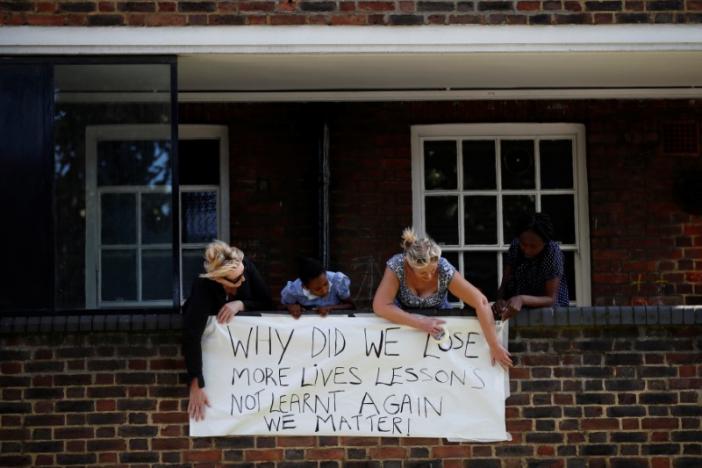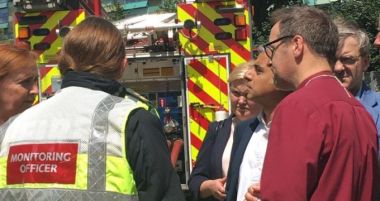Bishop of Kensington hits out over 'massive breakdown of trust' around Grenfell Tower disaster

The Bishop of Kensington has written of 'a massive breakdown of trust' around the Grenfell Tower disaster which, he says, 'did not happen in a vacuum' and came after many years of broken promises and unheard complaints.
Graham Tomlin wrote in The Independent that many residents feel that their presence was a nuisance to others in wealthier parts of the area and that there was a view that it would be better if the poorer blocks were 'run down so that fancy expensive housing could be erected to be sold off for a greater profit to foreign investors'.
He added that people in 'the smart streets of South Kensington' struggled to understand the 'visceral anger' felt by residents in North Kensington.
'We have seen the vital importance of trust and what happens when [trust] is lacking in the aftermath of the Grenfell Tower fire in the past few weeks... I have been closely involved with the communities around the Lancaster West estate over the past fortnight and beyond, and have watched and listened to the growing frustration of residents, the anger directed towards the Council, the Government, in fact anyone in authority. The anger has taken some by surprise, but it is less shocking when seen against the background of the dreadful events of 14 June,' Bishop Tomlin wrote.
'The Grenfell Tower fire did not happen in a vacuum. It came after many years of residents making complaints, feeling ignored and hearing promises that were not kept. Residents groups had often protested about the £10m refurbishment of Grenfell Tower that made it look good on the outside, without paying much attention to conditions and safety on the inside. A feeling has been growing among many residents, rightly or wrongly, that there were others who felt their presence was a nuisance, that it would be better if their blocks and homes were run down so that fancy expensive housing could be erected to be sold off for a greater profit to foreign investors. Complaints seemed to fall on deaf ears and in such a vacuum, conspiracy theories and rumours spread like wildfire. In other words, there has been a massive breakdown of trust.
'People in the smart streets of South Kensington struggle to understand the visceral anger felt by their neighbours in North Kensington. From the perspective of the south of the Royal Borough, RBKC felt like a reasonably well run Council that did a good job of keeping the schools running and the streets clean.'

The Bishop said that promises from the Prime Minister down are not believed because of 'many years' of exclusion from decision making and a lack of listening.
'The anger felt by those further north comes, not primarily as a result of a few days inaction by the Council or the Prime Minister failing to visit locals on her first visit to the site, but on the back of many years of feeling unheard, unwanted and excluded from decision making, all of which means that when officials, from the Prime Minister to the most menial employee of RBKC makes promises about keeping residents in the area, that air pollution levels are safe, and they have their best interests at heart, local people tend not to believe them,' Tomlin wrote.
'Mistrust is corrosive,' he added. 'In its miasmic presence, both true and false rumours gain credence, honest assurances are not believed, people assume the worst. Mistrust is like a fog in which it is hard to make out the genuine promise from the self-serving excuse. One of the key tasks facing those involved in the longer-term future of North Kensington is rebuilding trust. That task is long, takes careful determination and will not be done quickly. It requires repeated promises fulfilled, honest answers and a will from both sides to make it work. Some relationships that require trust (with the Tenant Management Organisation, for example) may be beyond repair, but elsewhere it will be as slow and painstaking as picking through the rubble of the Tower itself.'
Tomlin concluded: 'As lives, families, and the community in the Lancaster West estate are rebuilt, unless a serious attempt to rebuild trust is made, suspicion will continue to reign and destroy the small shoots of progress. If trust can slowly but surely be established, then this community has a hope and a future.'











